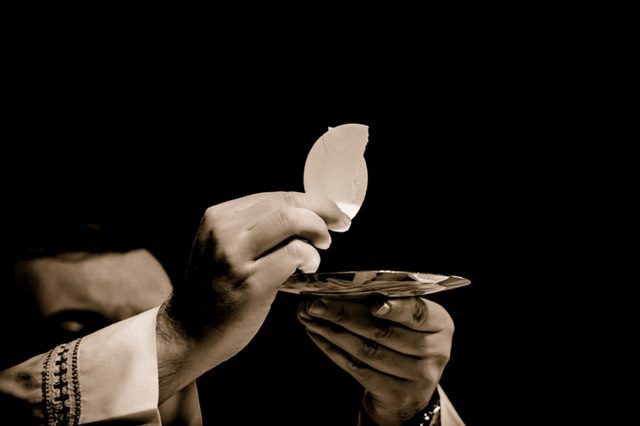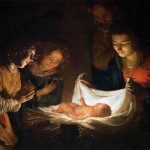A Guest Post by Les Lamkin
I have no need of a bull from your stall
or of goats from your pens,
10 for every animal of the forest is mine,
and the cattle on a thousand hills.
11 I know every bird in the mountains,
and the insects in the fields are mine.
12 If I were hungry I would not tell you…
Psalm 50: 9-12
I love this passage, but hate the way it is typically quoted. The psalmist is not extolling God’s ability to supply our needs, as is commonly thought. Instead, God is stating in clear and uncertain terms that He needs nothing from us. In my mind, I can hear Him chuckling as he says that last line, “If I were hungry, I would not tell you.”
I was involved in the contemporary worship movement nearly from its inception. In the late 70’s and early 80’s I played keyboards and bass in a Foursquare church. Even then, hymns were disappearing and being replaced by choruses from Integrity Music and Maranatha Music. In the mid 80’s, I got married and my wife and I returned to the Church of the Nazarene, the church of my childhood. We immediately set up my Korg M1 synthesizer and began teaching the church’s pianist and organist a variety of choruses. We brought the ‘worship wars’ into the church, sincerely believing that God was revamping worship; out with the old and in with the new!
Within a few years, we had the whole shebang; guitars, both acoustic and electric; a bass, drums, a bevy of vocalists, a high-powered (for our small church) PA system. My single synth morphed into a rack of sophisticated synthesizers. I incorporated a computer equipped with a digital audio workstation to do midi program changes, run a click track and flesh out additional computerized instrument tracks. We were doing it man!
And the metrics used to measure success?
Easy. People would arrive late, skipping the announcements and the rest of the preliminary stuff, but walking in just as the band was clicking off into the first upbeat, high-powered song. They wanted to worship! It was their chance to offer to God their most heartfelt devotion!
We packed the church. We were loud. If we were not directly responsible for the four-fold increase in worship attendance, at the very least, we weren’t driving people away with our driving drums, flashy blues-rift guitar and soaring vocals.
People would sing, dance, weep, and raise their hands, all in the name of expressing their love for Jesus and “offering a sacrifice of praise” to God.
But even then, I had questions. Doubts. The implication was that God desired our worship, wanted it and delighted in it. There was even a scriptural basis for the idea. After all, doesn’t the Bible say that God inhabits the praises of His people? Weren’t we offering our love to God, our devotion, our adoration? Isn’t this what He wants?
I found myself asking a problematic question: What does God get out of all this? Does He need it? Want it? Require it?
Christians believe that God is completely self-sufficient, self-existing and self-fulfilling. He exists in Trinity as Father, Son and Holy Spirit, the three living throughout eternity in the ultimate self-giving, all loving relationship. We call that relationship the divine life of God, a life He, as the Son and through the Holy Spirit, extends to us. As I thought about this, I developed a maxim for myself: Every expression of God towards humanity is outward. If God gets anything for Himself out of the relationship with us, He isn’t telling. That of course led to the question why does God need or want our worship?
The simple answer? He doesn’t.
If it is true that every expression of God towards humanity is outward, then somehow, worship is about God and for us.
So what do you give a God who has everything? Not music or dance. Not singing. I’m not saying that those things don’t have value, but the idea that worship consists of bands replete with drums, guitars, high-powered sound systems and performers (aka ‘worship leaders’) turns worship into performance and the adoration of God into the adoration of emotion. I remember telling my worship team that our job was to manipulate the emotions of the congregation so that we could then direct their emotions away from us and toward God. Even as I said it, I knew it was wrong, but I could not find any other justification for what we were doing.
I would suggest that if we love God, the only thing we can give him is ourselves, our obedience. Jesus never said, “If you love me, you’ll sing and dance in my name.” He said, “If you love me, you’ll keep my commands.”
Worship is about God in that God, and God alone, is the subject and object of our worship. Worship is for us in that worship is formative – not expressive – and intended to draw us into the divine life of God, creating in us the character and likeness of the God-man, Jesus Christ.
In the last couple of years, I have abandoned contemporary worship. I find myself drawn to the worship of the primitive church, a worship grounded in the practices of ancient Israel as given by Moses in which God laid out specific rites for how to approach Him. Not because God needed them, but because we need them. I find myself drawn to the life of sacramental worship, the worship practiced by the Apostles, the first century church, the Catholic and Eastern Orthodox Churches since the second and third centuries, the worship adopted by many of the Reformers and finally, sadly, largely abandoned by the American Revivalism of the 19th century.
I agree with C.S. Lewis when he said, “All our offerings, whether of music or martyrdom, are like the intrinsically worthless present of a child, which a father values indeed, but values only for the intention.”
Anything I can bring to the table of God’s banquet is paltry. I can picture myself in Paradise, standing before the everlasting throne of the Ancient of Days, my Telecaster slung over my shoulder and launching into my favorite worship song. God would stop me, lay His hand across the strings, smile at my useless offering and, just as multitudes of heaven’s choirs break into an anthem of unimaginable beauty He would, with a touch of playfulness in His voice, say, “I own the cattle on a thousand hills. If I were hungry, I would not tell you.”
Amen and amen.
Les Lamkin teaches English and music in the Mansfield School District and is an adjunct English composition instructor at Wenatchee Valley College in Wenatchee, Washington. He is also an amateur musician who spent decades in the Contemporary Worship movement before abandoning it completely to search for a life of sacramental worship. Born and raised in Chelan, Washington, he resides there still with Patricia, his lovely bride of 33 years and their eight cats.
Photos:
unsplash.com
pixabay.com
















